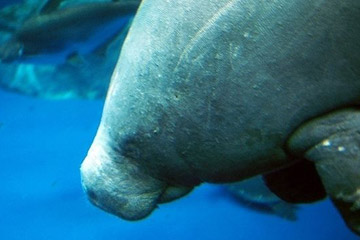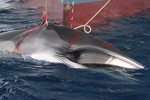In the Lower Basin of the Sanaga River in Cameroon, near Lake Ossa and the Douala-Edea National Parks, manatees swim and float about like round, potato-shaped mermaids. This region is home to the West African manatee (Trichechus senegalensis), an aquatic mammal facing a decline in population. Classed as Vulnerable by the IUCN Red List, the West African manatee is threatened by excessive kills, habitat loss, and habitat degradation. Given this, and the dearth of information about manatees, a group of Cameroon scientists have taken an ethnobiological approach (i.e. the interaction between people and wildlife) by employing skilled, knowledgeable locals to collect data on the manatees.
 West African manatee in the Toba Aquarium, Japan. Photo by: Open Cage/Creative Commons 2.5 |
Researchers interviewed fishermen, shell collectors, and users of natural resources to assess the current conservation status of manatee in lakes, rivers, and coastal regions. Little is known about manatees, especially in Africa, as they live in dark and muddy waters. However, since the participating locals see manatee more often than scientists, they were asked whether manatees are still present in the Lower Sanaga Basin; whether the population has grown, decreased, or stayed the same in the last five years; and what are the main problems manatees face for their survival.
The study, published in mongabay.com’s open access journal Tropical Conservation Science, found that manatee are still present in the region with the number having either increased or stayed the same. However, despite the seemingly sustainable numbers in the region, threats are still present.
One problem is manatees are either caught intentionally for bushmeat or accidentally in nets and other fishing gear. Also, another problem is water pollution by fishing enterprises, industrial plantations, and individuals. Solutions, according to the study, include: increased law enforcement, education, sensitization, and ecotourism, amongst others.
Citations:
- Mayaka, T. B., Awah, H. C. and Ajonina, G. 2013. Conservation status of manatee (Trichechus senegalensis Link 1795) in Lower Sanaga Basin, Cameroon: An ethnobiological assessment. Tropical Conservation Science. Vol. 6(4):521-538.
Related articles
Sonar used by oil company caused mass whale stranding in Madagascar
(09/25/2013) An oil company’s use of a high-frequency mapping sonar system was responsible for a mass whale stranding in northwest Madagascar in 2008, finds a new report.
Climate change scattering marine species
(08/08/2013) Rising ocean temperatures are rearranging the biological make-up of our oceans, pushing species towards the poles by 7kms every year, as they chase the climates they can survive in, according to new research. The study, conducted by a working group of scientists from 17 different institutions, gathered data from seven different countries and found the warming oceans are causing marine species to alter their breeding, feeding and migration patterns.
Galapagos sea lions threatened by human exposure

(07/19/2013) A recent study conducted by the Zoological Society of London (ZSL) on endangered Galapagos sea lions (Zalophus wollebaeki) has revealed that the animals are more susceptible to starvation as a result of their exposure to humans. Over a span of more than 18 months, conservationists tagged and monitored the behavior and physiology of two groups of 60 Galapagos sea lions, one in San Cristobal, which is inhabited by humans, and one in Santa Fe, where there are no humans, dogs, cats, mice, or rats.
Yangtze finless porpoise drops to Critically Endangered
(07/07/2013) The newest update to the IUCN Red List has downgraded the status of the Yangtze finless porpoise (Neophocaena asiaeorientalis asiaeorientalis) from Endangered to Critically Endangered, reflecting the deteriorating state of arguably the world’s most degraded river system. The downgrade follows a survey last year that counted only 1,000 animals, a 50 percent decline from 2006.
Australia aims to end Japan’s whaling

(06/27/2013) Australia is hoping to put a permanent end to Japan’s annual slaughter of hundreds of whales in the Southern Ocean, in a landmark legal challenge that begins this week. Australia, a vocal opponent of Japan’s annual “scientific” hunts in the Antarctic, says it is confident that the international court of justice (ICJ) in The Hague will outlaw the hunts at the end of a highly anticipated case that is due to start on Wednesday.
Whales teach each other new feeding behavior

(05/29/2013) Humpback whales (Megaptera novaeangliae), popularly known for their majestic and alluring underwater mating songs and acrobatic breaches, have shown that they can adapt to changing prey variability by passing on new hunting techniques to each other. According to new findings in the journal Science, a team of researchers have revealed the cultural spread of new hunting techniques through a population of humpback whales over the span of 27 years.